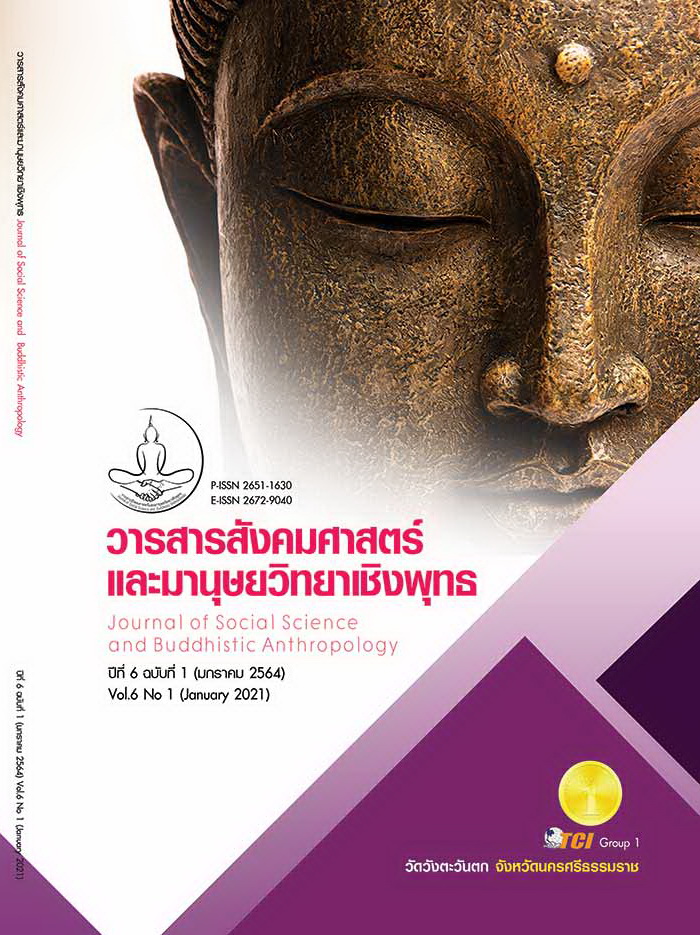RESILIENCE OF FAMILY CAREGIVER: AN IMPORTANT TO CARING ELDERLY DIABETES MILITUS PATIENTS
Keywords:
Family Caregiver, Elderly with Diabetes Mellitus, ResilienceAbstract
A family caregiver is a member who takes role as a primary caregiver following elderly diabetes mellitus patient problems and demands from patient’s physical disability, cognitive impairment, and personal demands make change and impact to the caregiver’s resilience. This article aims to present a literature concept, factors effecting to resilience, promoting resilience measurement of resilience and benefit of resilience.Elderly diabetes mellitus patients are prevalent increases all over the world, and it is chronic disease that must be maintained for a continuous, long. In the meantime, the elderly are the groups that needs to be prioritized because physical and intellectual abilities degenerate with age, making it limited to take care of one’s health. Family caregiver of elderly diabetes mellitus patients are very important to reduce health problems and complication of diabetes mellitus. Because diabetes mellitus is a chronic disease, person who have it need to be cared for or monitored their health continuously. While elderly diabetes mellitus patients caregiver potential recession, because caregiver be both responsible for make money and caring. Family caregiver can face up to any problems encountered. Resilience is one factor that contribute caregiver to adapt and recover after encountering a crisis or difficult situation. Resilience is necessary for family caregiver of elderly with diabetes mellitus. Therefore it is important to understand the basic knowledge and concept to resilience coordinate care for elderly diabetes mellitus patient and family caregiver. Making it ready to take care for elderly diabetes mellitus patient effectively.
References
กรมสุขภาพจิต. (2552). คู่มือการจัดกิจกรรมการสร้างพลังอึด ฮึด สู้ ในชุมชน. นนทบุรี: บียอนด์ พับลิสชิ่ง จำกัด.
ดวงเดือน พันธุมนาวิน. (2554). บทสัมภาษณ์แนวทางการพัฒนามาตรฐานจริยธรรมข้าราชการพลเรือน (อัดสําเนา). กรุงเทพมหานคร: สํานักงาน ก.พ.
ดามาตะ คาทะสี และอธิคม สวัสดิญาณ. (2554). เคล็ดลับวิธีตัดสินใจ. กรุงเทพมหานคร: สำนักพิมพ์เต๋าประยุกต์.
นฤภัค ฤธาทิพย์ และคณะ. (2552). คู่มือสร้างสรรค์พลังใจให้วัยทีน. นนทบุรี: กองส่งเสริมและพัฒนาสุขภาพจิต กรมสุขภาพจิต กระทรวงสาธารณสุข.
นันท์นภัส ประสานทอง. (2562). โปรแกรมเสริมสร้างพลังใจญาติผู้ดูแลผู้สูงอายุ คู่มืออบรมโปรแกรมเสริมสร้างพลังใจญาติผู้ดูแลผู้สูงอายุ. นนทบุรี: กองส่งเสริมและพัฒนาสุขภาพจิต กรมสุขภาพจิต กระทรวงสาธารณสุข.
ประเวช ตันติพิวัฒนสกุล. (2550). แนวทางการจัดกิจกรรมการเรียนรู้การสร้างความเข้มแข็งทางใจ สำหรับนักเรียนชั้นมัธยมศึกษา. นนทบุรี: โรงพิมพ์ชุมนุมสหกรณ์การเกษตรแห่งประเทศไทย.
พัชรินทร์ นินทจันทร์ และคณะ. (2555). โปรแกรมการสร้างความแข็งแกร่งในชีวิต (A resilience enhancing program). กรุงเทพมหนคร: จุดทอง.
เพ็ญประภา ปริญญาพล. (2550). มยืดหยุ่นและทนทานของนักศึกษามหาวิทยาลัยสงขลานครินทร์ วิยาเขตปัตตานี. วารสารสงขลานครินทร์ ฉบับสังคมศาสตร์และมนุษยศาสตร์, 13(2), 137-153.
มณีวรรณ สุวรรณมณี. (2556). ความสัมพันธ์ระหว่างพลังสุขภาพจิตกับการรับรู้ภาระการดูแลของผู้ดูแลผู้บาดเจ็บจากเหตุการณ์ความไม่สงบในจังหวัดชายแดนใต้ของไทย. ใน วิทยานิพนธ์พยาบาลศาตรมหาบัณฑิต สาขาวิชาการพยาบาลผู้ใหญ่บัณฑิตวิทยาลัย. มหาวิทยาลัยสงขลานครินทร์.
มาลิณี จุโฑปะมา. (2553). การเห็นคุณค่าในตนเองนั้นสำคัญไฉน? และจะสร้างได้อย่างไร. วารสารวิขาการมหาวิทยาลัยราชภัฏบุรีรัมย์, 2(2), 13-16.
ศิริเพิ่ม เชาว์ศิลป์. (2546). การวิเคราะห์องค์ประกอบของแบบทดสอบบุคลิกภาพการปรับตัวเพื่อสู่ความเป็นเลิศ. เชียงใหม่: โรงพิมพ์มหาวิทยาลัยเชียงใหม่.
สมพร อินทร์แก้ว และคณะ. (2552). คู่มือเปลี่ยนร้ายกลายเป็นดี: พลัง สุขภาพจิต. นนทบุรี: สำนักสุขภาพจิตสังคม กรมสุขภาพจิต กระทรวงสาธารณสุข.
สายพิณ เกษมกิจวัฒนา และปิยภรณ์ ไพรสนธ์. (2557). ญาติผู้ดูแลผู้ป่วยเรื้อรัง: กลุ่มเสี่ยงที่ไม่ควรมองข้าม. วารสารสภาการพยาบาล, 29(4), 22-31.
สำนักโรคไม่ติดต่อ. (2561). ประเด็นสารรณรงค์วันเบาหวานโลก ปี 2561. เรียกใช้เมื่อ 19 ตุลาคม 2561 จาก http://www. thaincd.com/document/file/info/.../ประเด็นสารรณรงค์วันเบาหวานโลกปี_2561.pdf
สุภาวดี ดิสโร. (2551). ผลองกลุ่มจิตวิทยาพัฒนาตน และการปรกษาแนวพุทธต่อความสามารถในการฟื้นพลังของนักศึกษามหาวิทยาลัย. กรุงเทพมหานคร: จุฬาลงกรณ์มหาวิทยาลัย.
Brolin, D. E. (1989). Life Centered Career Education: A Competency Based Approach (3rd ed.). Reston, VA: The Council for Exceptional Children.
Davis, N. J. (1999). Resilience, Status of the Research and Research-Based Model. Retrieved April 22, 2017, from http://menalhealth.sahsa.gvo/shoolviolence/5-8resilience.asp
Garmezy, N. (1991). Resiliency and vulnerability to adverse development associated with poverty. American Behavioral Scientist, 34(1), 416-430.
Grotberg, E. H. (1995). A guide to promoting resilience in children: Strengthening the uman spirit. The Hague, Netherlands: Bernard Van Lee Foundation.
Grotberg, E. H.(1999). Tapping your inner strength. Oakland, CA: New Harbinger.
Grotberg, E. H. (2005). Resilience for tomorrow. Retrieved January 6, 2019, from http://www. resilnet.uiuc.edu/library/grotberg2005_resilience-for-tomorrow-razil.pdf
Grotberg, E. H. (2004). Resilience for tomorrow.Retrieved April 22, 2017, from http:// www.resilnet.uiuc.edu/library/grotberg2005_resilience-for-tomorrow-brazil.pdf
Hangan P. et al. (2003). Economic Costs of Diabetes in the U.S. in 2017. American Diabetes Association, 26(3), 917-932.
Hiew, CC. et al. (2000). Measurement of resilience development preliminary results with a state-trait resilience inventory. Journal of Leaning and curriculum Development, 1(1), 111-117.
Rutter, M. (1985). Resilience in the face of adversity: Protective factors and resistance to psychiatric disorder. British Journal of Psychiatry, 147(1), 598-611.
Werner, E. E. (2005). Resilience research past, present, and Future. In R. DeV. Peter, B Leadbeater & R. J. McMahon (Eds.), Resiliencein childern, families, communities linking context to practice and policy (pp. 3-11). New York: Kluwer Acadeic/plenum.
Wolin, S. J. & Wolin, S. (1993). The Resilient Self: How Survivors of Troubled Families Rise Above Adversity. New York: Villard Books.






